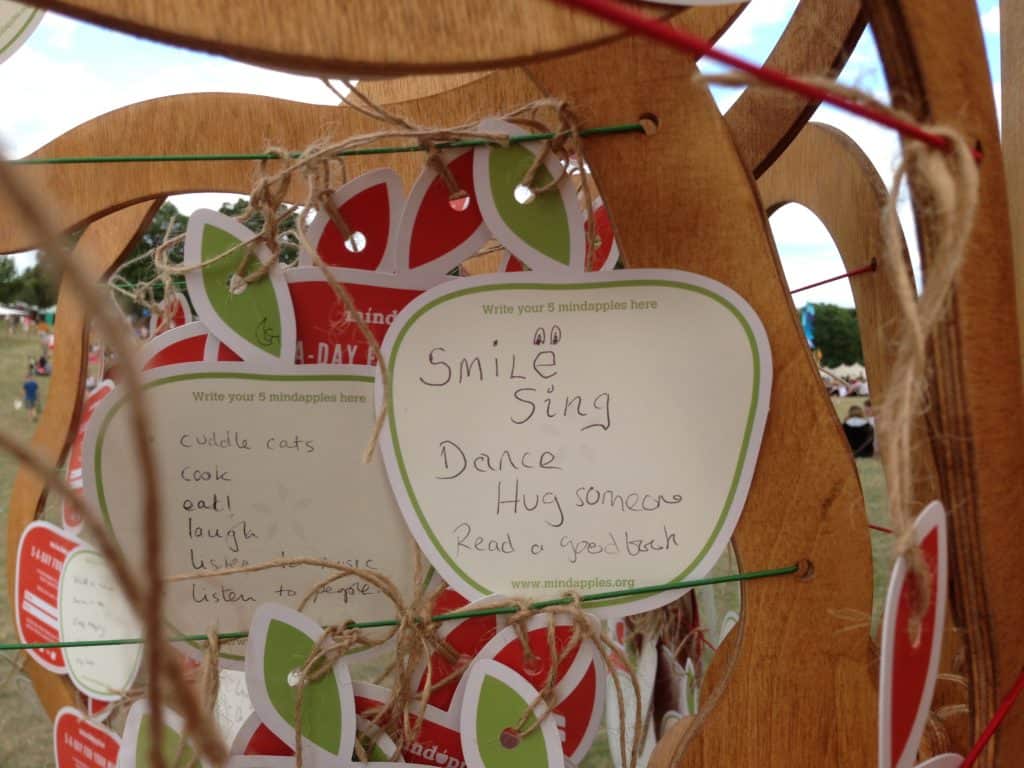
It’s been inspiring and encouraging to see the publicity around the Young Minds Matter series launched by The Duchess of Cambridge when she was guest editor of the Huffington Post this month. Especially the theme of taking preventative action.
At Mindapples, that’s obviously a theme that is close to our hearts. If you’ve come across us before you’ll know that Mindapples started with the awareness raising question “What’s the 5-a-day for your mind?” and the answers were called ‘mindapples’.

People’s mindapples can frequently be categorised as breathers or restorers, and research (Pressman et al 2009) shows that breathers and restorers are good for mental wellbeing.
“Breathers” are a chance to take a break and distract yourself from the demands and concerns occupying your mind, maybe it’s taking time out to relax with a cup of tea, or spending time in nature. Leisure activities act as “restorers”, helping us cope with stress by replenishing our resources, for example through spending time with loved ones who make us feel cared for and more able to cope.
Having the concept of a mindapple and 5-a-day for your mind does more than just raise awareness that what we do affects how we feel – and that we can take action to look after our mental wellbeing. It provides an easy, non-threatening way to talk about our minds that anyone can join in with. Just come out with the Mindapples Tree one day and you’ll see all ages completing mindapple-cards, from children who need a parent or sibling to help with the writing (though not always, we accept pictures too) through to, presumed, octogenarians (or more, we don’t ask).

What then though? Once we’re aware that we can do things to look after our minds, what else do we need to know about them? And, more to the point, how come we don’t already know? Where is the education about our minds that there is about our bodies?
With the training that we developed at Mindapples we aimed to cover the topics that will help with understanding what is going on in everyday life and with making the most of our minds: how come I’ve eaten that cake when I told myself – very severely – that I wasn’t going to? I’d really love to be able to play the piano so how come I haven’t started learning? How come that ‘little bit of stress’ that’s supposed to be good for me doesn’t feel so good?
The other benefit of learning things like this – especially if other people learn them too – is that it means we all have the language with which to talk about what’s going on in our minds. If we aren’t able to have a meaningful conversation about our minds when we’re OK, how much more difficult will it be to have that conversation when we’re starting to worry? And what words do we use? How do we make sure the other person understands?
If we all have enough knowledge about our minds, and through that a common vocabulary for talking about our minds, there will be many more conversations and it will become as normal to talk about how we keep our minds healthy as it is to talk about how we keep our bodies healthy. Common-sense suggests that once we get to that point, not only will it be easier to talk to someone if we think we may need some help, but also that, with knowledge and conversations being out there, we may never get to that point.
We’re not aware of any specific research on whether the common-sense theory holds out but there’s hope for it.
Meanwhile, back to the Leap Year Wish. The wish is that by the next leap year, taking action to look after our minds will be commonplace: learning about minds will be in the National Curriculum, available in youth organisations, part of university education, and an expected provision in workplaces just as is health and safety training. Imagine that.
References & links
‘Let’s Make a Real Difference for an Entire Generation of Young Children’, Her Royal Highness The Duchess of Cambridge http://www.huffingtonpost.co.uk/her-royal-highness-the-duchess-of-cambridge/lets-make-a-real-difference-for-young-children_b_9246336.html
‘Approach mental health like cancer care: prevention is key’, Jenny Edwards, Chief executive, the Mental Health Foundation http://www.theguardian.com/healthcare-network/2016/feb/17/mental-health-cancer-care-early-prevention
Pressman, S.D., Matthews, K.A., Cohen, S., Martire, L. M., Scheier, M., Baum, A., Schulz, R. (2009) Association of enjoyable leisure activities with psychological and physical well-being. Psychosomatic medicine 71 (7), 725-732
Prevention Review: Landscape Paper, The Mental health Foundation, November 2015 https://www.mentalhealth.org.uk/sites/default/files/prevention-review.pdf
